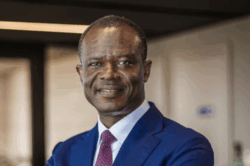Huge revenue losses associated with the outbreak of COVID-19 and projected losses due to the impact of the pandemic has pushed government to downgrade its Gross Domestic Product (GDP) growth from 6.8 percent to 0.9 percent.
This was announced by the Minister of Finance Ken Ofori Atta during the presentation of the Mid-Year Review of the Budget Statement and Economic Policy of the Government of Ghana and Supplementary Estimates for the 2020 Financial Year.
According to the Minister, COVID-19 has led to disruption in corporate and general business confidence, with threats to projected revenues, profitability, liquidity and corporate growth.
So far 19 out of the 28 State-Owned Enterprises (SOEs) have projected losses up to GH¢1.55 billion for 2020. They have also been directed to cut down their budgets to contain the effects of outbreak of the coronavirus and help government contain the spread.
He added that, restrictions on movements and enforcement of social distancing protocols severely affected the transport sector, resulting in commuter mini bus services or tro-tro, operating at 70 percent load capacity whilst inter-city buses have passengers reduced by 50 percent between March and May.
“The operations of Metro-Mass Transport experienced a decline in monthly revenue from GH¢5.5 million to GH¢2.1 million. The Intercity STC Company witnessed decline in bus services and luggage revenue from average of GH¢5 million in previous months to average of GH¢3 million since March 2020.
The Driver and Vehicle Licensing Authority also experienced losses as revenue fell drastically from GH¢3.5 million to about GH¢1 million between March and April 2020. 29 128. Evidence presented by the Tour Operators Association shows 11,558 tourists cancelled their visits to Ghana, leading to a projected year-to-date revenue loss of GH¢4.8 million,” the minister told parliament.
Touching on the impact of the pandemic of the energy sector, the minister said: “the significant impact is on exploration, appraisal and production of oil and gas activities, including delays in implementing the 2020 work programmes of operators. The Petroleum Commission has estimated that projects valued at US$324 million across the petroleum upstream sub sector have stalled or been postponed due to the pandemic.
Aker Energy, for instance, has notified the Ministry of Energy of the postponement of the Pecan field development. This has impacted the delivery of first oil from the Pecan project, thereby postponing projected revenues to Government. These postponements could weaken the critical role of the oil and gas sector in propelling economic growth. 130.”
He noted that it is only the solid foundation established by this government and the resilient buffers built by the Bank of Ghana that has saved the economy from contracting, as have happened in many countries.
“The fiscal cost of the COVID-19 pandemic is enormous. When I appeared before this august house in March this year, I informed Honourable Members that the total fiscal impact of the pandemic was estimated at GH¢9,505 million (2.5% of revised GDP), stemming from shortfalls in petroleum receipts, import duties, and other tax revenues, the cost of the Emergency Preparedness Response Plan, and the cost of the Coronavirus Alleviation Programme.
Updated fiscal estimates indicate that revenues are expected to fall short of the 2020 Budget target by GH¢13,632 million (3.5% of revised GDP) arising from shortfalls in Petroleum Receipts of GH¢5.3 billion; Non-Oil Tax revenue GH¢5.1 billion; and NonTax Revenues of GH¢3.3 billion.”
Expenditures, on the other hand, he noted, are expected to increase by GH¢11.66 billion (3.4% of revised GDP), reflecting mainly expenditures on COVID-19 Preparedness & Response Plan, provision of Health Infrastructure (Agenda 88+), Coronavirus Alleviation Programme, capitalisation of National Development Bank, security, elections, and payment of outstanding claims government’s leadership and immediate response.”










